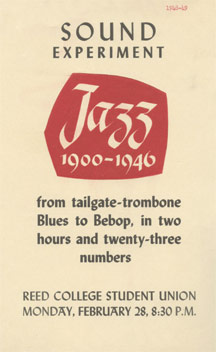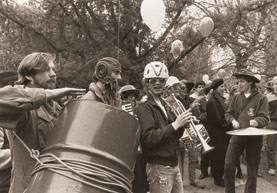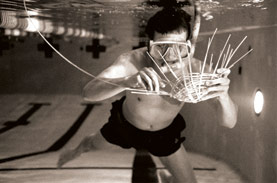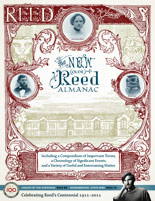
IRIS login | Reed College home Volume 90, No. 4: December 2011
The New (Olde) Reed Almanac (continued)
Scott Tissues: Maggie Scott ’19 [registrar 1923–62] was notorious for curt notices alerting students to their paperwork deficiencies. These missives became known as Scott Tissues, as revealed in this bit of doggerel:
My name is Margaret Scott.
I’m a keeper of records and rot.
If you’re making an issue
I’ll give you Scott’s tissue
That’s not worth a tittle or jot.
Scrounging: The tragedy of the commons.
Seventies, The: Charles Svitavsky [English 1961–98] once reflected on the campus mood of this turbulent decade. “In the ’60s, when I walked into class in the morning and said, ‘Good morning,’ the students wrote it down. When I walked in and said ‘good morning’ in the ’70s, students would say, ‘Oh, I don’t know about that, it doesn’t seem that good to me.’”
Shelley by Moonlight: After World War II, the GI Bill helped many veterans go to college, including Tom Kelly ’48. One night, while waiting for a bus on Woodstock Boulevard, Tom stood under a streetlight reading a book of poems by Percy Bysshe Shelley. Passing police officers stopped, found his reaction to their questioning suspicious, and hauled him down to the station. The following night, 100 students gathered at the bus stop to read poems in protest, making national headlines.
Simplified spelling: When Noah Webster published his first volume on spelling and grammar in 1783, he wanted nothing less than to shape the character of a nation. Both his textbooks and, later, his dictionaries reflected his conviction that America’s language—its spelling, its grammar, even its definitions—played a key role in its identity. A century later, the simplified spelling movement posed a similar connection between language and politics. Attracting luminaries such as Andrew Carnegie and Mark Twain, the movement tried to build common sense into the spelling of English so people could learn it more easily; a universal language, they reasoned, would help bring about world peace. Reed’s first president, William T. Foster, was a passionate adherent who brought his convictions about spelling—and world peace—with him, encouraging simplified spelling in Reed’s early publications. Conservative Portlanders were aghast, deriding Reed—and its nonconformist East Coast radicals—for spellings such as hav, enuf, tung, buro, and maskerade. Foster continued to champion the movement as an example of Reed’s resolve to “stand staunchly—and if necessary, stand alone—for whatever was right.” Nevertheless, the practice didn’t stick, and by 1918, Carnegie himself gave up on the idea. “I think I hav been patient long enuf . . . I have a much better use for twenty-five thousand dollars a year.” If only they had been around for Twitter.
Sociology: A science whose practitioners take commonsense propositions, translate them into impenetrable argot, perform strange experiments, and draw far-reaching conclusions that no one else understands. Intriguing courses have included Theories and Problems of Social Ethics; Neighborhood Progress; Economic, Social, and Political Problems of the Northwest; Ethnic Minorities; Technology and Society; and The Collapse of Communism. Influential profs (q.v.) have included William Ogburn [1912–17], Alexander Goldenweiser [1933–39], Howard Jolly [1949–70], John Pock [1955–98], William Tudor [1973–2009], Alexandra Hrycak [1998–], and Marc Schneiberg [2000–].

Sound experiments: First launched by professor Herb Gladstone [music 1947–80], the monthly performances took place in the old student union before a blazing fireplace. Innovation was the watchword. The very first was billed as “Jazz from tailgate-trombone Blues to Bebop, in two hours and twenty-three numbers.”
Spanish: The language and culture of the greatest civilization ever known. First offered at Reed in 1912, Spanish was taught both as language and as literature, but disappeared from the curriculum after 10 years. It staged a valiant comeback in the 40s, when five classes were listed, but vanished again after another decade. Restarted in 1967, Spanish has gained ground ever since. Intriguing courses have included Chicano Literature and Popular Culture; The Epics of the Conquistadors; Borges, Vallejo, Lezama, and the Limits of Expression; Chronicling America; Crime and Detection; Sexual Imagery from Medieval Manuscript to the Printed Text; and Realism and Magic. Influential profs (q.v.) have included Benjamin Woodbridge [1922–52], Angela Ayres [1966-73], Robert Johnston [1977–86], Sharon Larisch [1986–], Lourdes de León [1987–97], Libby Drumm [1995–], Katharine Jenkes [1997–2004], Diego Alonso [2001–], and Ariadna García-Bryce [2001–].
Spring crisis: Annual campus controversy typically taking place in March or April, just as sunshine deprivation is reaching its nadir. (See rain.) An early example involved the explosive charge that female students were smoking cigarettes. In 1924, the issue was smallpox vaccination—a quarrel that grew so heated that President Richard Scholz (q.v.) rose from his sickbed in an effort to quench the flames (the strain contributed to his death). By 1940, the eruption of a vernal controversy at Reed had become so predictable that students actually staged a vaudeville show dubbed The Spring Crisis. The 1940 show involved pompous senators investigating communism at a “Pinkweed College.” Another show spoofed the tale of Noah’s Ark (whose vessel collapsed during rehearsals, fortunately harming no one). The tradition of the spring crisis continues, having revolved around issues as contentious as intervisitation and as obscure as departmental pay equity, and shows no sign of flagging, despite efforts to nudge it into May, when the occasional appearance of the sun makes things seem less dire.
Stanley Moore affair: In 1954, at the height of anti-communist hysteria, the House Un-American Activities Committee summoned three Reed professors—Leonard Marsak [history 1953–55], Lloyd Reynolds [art and English 1929–69], and Stanley Moore [philosophy 1948–54]—to testify about their alleged ties to the Communist Party. They declined, inflaming local suspicion that Reed was a den of pinkos. In response, President Duncan Ballantine [1952–54] and the board of trustees suspended Reynolds from teaching his summer course on art history and demanded that the professors explain their political views in private. Moore refused, arguing that the board had no right to question him about his political beliefs. The board fired him, despite the fact that he was tenured. Although professors at other institutions were fired under similar circumstances with little protest, the episode shook Reed to its core because it cast doubt on the college’s commitment to academic freedom. Students, professors, and alumni were appalled. Ballantine lost the confidence of the faculty and resigned. In 1981, after years of controversy, the trustees issued a statement of regret. In 1997, Moore, then near death, participated in a campus forum on the affair. “I think what we’ve learned is that colleges should be more careful in the selection of trustees,” he said.
Steam tunnels: Network of subterranean passages emanating from the massive central boiler in the physical plant, designed to transfer steam heat to campus buildings. Spelunking in them has been a popular Reed hobby from the founding. Betty Hines Holzer ’29 recalled picnicking with friends in the “Dutch ovens.” Steve Yeadon [facilities 2006–] points to two remarkable features: the montage of graffiti done by students over the years and the footprints in the cement floor—evidence of the workers who set the forms and poured the concrete in this first campus infrastructure. All tunnel openings are locked, but students still manage to find a way in, as fresh examples of graffiti attest. Rumor holds that a considerable number of garden gnomes have also found their way in over the years.
Student-faculty ratio: For most of its history, the college’s ratio hovered around 10–1. In the early 70s, facing a financial crisis, the faculty raised the figure to 12–1. This lasted until 1999, when President Steven Koblik led a campaign to add more professors and get the ratio back to 10–1. That effort, combined with support from Reed’s centennial campaign, has driven the current ratio down to 10.2–1.
Sullivan, Richard [prez 1956–67]: During his 11-year tenure—unusually long by Reed standards—Sullivan was able to do what many presidents could not: expand. A Harvard graduate and World War II veteran, Sullivan hiked faculty salaries, hired new professors, and implemented (for the first time) a sabbatical program. This helped make Reed a national institution and bolstered its reputation. Sullivan oversaw the construction of several buildings, including new biology and physics labs, residence halls, a sports center, the commons, bookstore, and a library addition. He also tried to establish a grad school (“Reed U”), which ultimately went nowhere. After Reed, he became president of the Association of American Colleges.
Theatre: The study of the world as a stage. It never metaphor it didn’t like. Theatre played a key role in student life from the founding of the college, but Reed did not offer formal instruction until 1936. The discipline gained its own department two years later. Fascinating courses over the years have included Radio Broadcasting, Theatre and the Media, Plays and Playhouses, Experimental Theatre, Stagecraft, and Gender and Theatre. Influential figures have included Kay Stuurman [1928–42], Frank Kierman [1941–46], Seth Ulman [1959–73], Cara Carr [1975–2005], Craig Clinton [1978–2010], Kathleen Worley [1985–], and Max Muller [1988–2006].
Thesis: A graduation requirement since the very beginning; the library’s collection now numbers about 14,325 (the exact figure depending on whether the thesis of Gary Snyder ’51 has been stolen again). The rules regarding formatting, deadlines, penalties for late submission, and the composition of orals committees were informal in the first years; President Dexter Keezer had them codified in 1937. Theses must be submitted to the registrar by the last Friday of classes. The shortest thesis (Kenneth Tomlinson ’15, Losses in the Electro-Analysis of Copper Sulphate Solutions, chemistry) runs four pages, while the longest (Carl Washburn ’66, A Sometimes Great Nation: A Story of American Politics, poli sci) runs an astonishing 506. Don Green ’54 took 50 years to complete his economics thesis, receiving his diploma in 2004 for Principal Agent Theory: Case Study of the Presidio Trust. (He wrote a perfectly adequate thesis in 1954, but was dissatisfied, ditched it, and did not find another topic until decades later.) Olin Balch ’73 delivered his psychology thesis, The Restoration of Avoidance Responses, on horseback. On thesis day, Olin galloped across the front lawn, dismounted, walked his horse up a flight of steps in Eliot Hall, remounted, and submitted his thesis to President Paul Bragdon.

A barrel of fun. Larry Clarkberg ’87 bangs drum as students don outlandish headgear during thesis parade, circa 1987.
Thesis parade: First organized in 1961 by Priscilla Watson Laws ’61 and Jerry Millstein ’61. “In previous years many of us watched seniors straggle up to the registrar’s office one by one and then slink off quietly to collapse,” they later wrote. “Having worked hard on our projects, we decided that the delivery of our senior theses should be conducted with proper ceremony.” On the appointed day, a rumpled band of barefoot seniors convened in front of the library accompanied by trombone, accordion, recorder, and drum, and proceeded to march to the registrar’s office. Since then, the tradition has grown more elaborate but no less exuberant. Students have tossed pages of notes from the roof of Eliot or burned them in a fire pit in front of the library. The parade has been led by marching bands and punctuated by the blast of cannons. Glitter, champagne, or rose petals—it’s always raining something. The trappings may vary, but the exhilaration never wanes.
Timê: Ancient Greek concept of “honor,” which Reedies encounter in their first week of Hum 110 as they try to figure out why Achilles, Hector, and Odysseus are acting so weird. Students also earn timê for scrounging, rugby, stealing the owl, and pulling off a double major.
Trustees: The buck stops here.
Tuition: Currently $42,540 a year; add $11,050 for room & board. See financial aid.
Underwater basket weaving: It was a joke, of course. Since the ’50s, “underwater basket weaving” has been used to refer to obscure or absurd college courses. Naturally, Reed students thought it would be fun to actually teach such a course at Paideia. A classic photo of a snorkeled student suspended in the pool weaving a basket still appears in the viewbook. You might think that after 40 years, the joke would wear out. Not at all. Several times a year, interns from peripheral news outlets dedicate roughly seven minutes to writing uncredited feature stories about absurd college courses. Inevitably, tucked between The Physics of Star Trek and The T’ao! of Homer Simpson is Underwater Basket Weaving at Reed College—now held up as an example of the very trend it was supposed to lampoon. Mother Nature Network provided a typical example of shoddy journalism in its “15 Weird College Courses.” “[U]nderwater basket weaving actually involves making baskets by dipping reeds into water and letting them soak—at least that’s how Reed College of Portland in Oregon taught it.”
Winch, Martin (1858–1915): Nephew of Simeon and Amanda Reed (q.v.), who came west to live with them at the age of 12 and became a surrogate son and business manager. At Amanda’s deathbed, Winch vowed to carry out her wishes. He withstood a furious legal challenge from the other heirs, who tried to break her will. Thanks to his efforts, the will was ultimately upheld and the college was born. Unfortunately, Winch clashed with T.L. Eliot (q.v.) over the character of the institution. Winch wanted a technical school, believing that was consistent with the Reeds’ wishes; Eliot insisted on a liberal arts college. Eliot won; Winch resigned from the board and entered a physical and emotional decline, dying a few years later. The bronze plaque dedicated to him in the Capehart room in Winch is a masterpiece of understatement: “He rendered valued aid in the founding of this college.”
Zeus: Mighty son of Kronos, marshal of thunderheads, father of gods and men.
Special thanks to Jim Kahan ’64, Gay Walker ’69, Patty MacRae ’71, Lauren Lassleben ’75, John Sheehy ’82, Sally Brunette ’83, Tonio Andrade ’92, Ian Gillingham ’94, Catherine Hinchliff ’10, Brandon Hamilton ’11, Lucy Bellwood ’12, Randall S. Barton, Ted Katauskas, Stacey Kim, Mark Kuestner, Laurie Lindquist, Kevin Myers, and Aimée Sisco for their outstanding contributions. Errors and omissions are the fault of Chris Lydgate ’90. Please send clarifications, corrections, or seething jeremiads to reed.magazine@reed.edu or check out the Open Almanac, our bold experiment in community journalism, and fix it up yourself!



LATEST COMMENTS
steve-jobs-1976 I knew Steve Jobs when he was on the second floor of Quincy. (Fall...
Utnapishtim - 2 weeks ago
Prof. Mason Drukman [political science 1964–70] This is gold, pure gold. God bless, Prof. Drukman.
puredog - 1 month ago
virginia-davis-1965 Such a good friend & compatriot in the day of Satyricon...
czarchasm - 4 months ago
John Peara Baba 1990 John died of a broken heart from losing his mom and then his...
kodachrome - 7 months ago
Carol Sawyer 1962 Who wrote this obit? I'm writing something about Carol Sawyer...
MsLaurie Pepper - 8 months ago
William W. Wissman MAT 1969 ...and THREE sisters. Sabra, the oldest, Mary, the middle, and...
riclf - 10 months ago